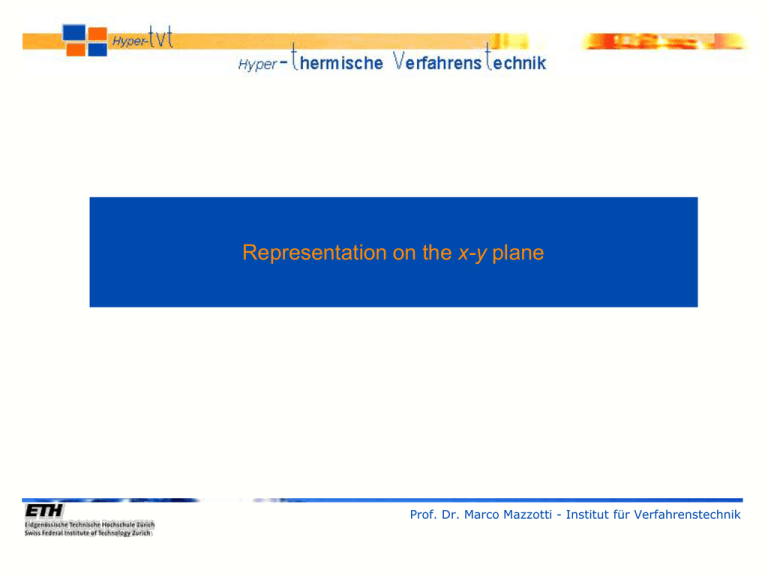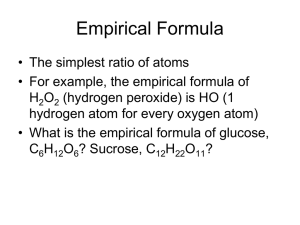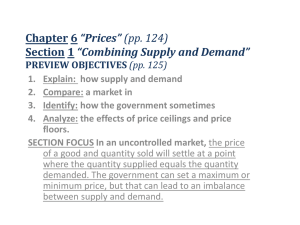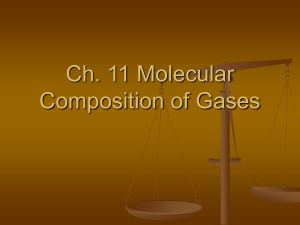1-Thermodynamics: representation in the x-y plane - Hyper-TVT
advertisement

Representation on the x-y plane Prof. Dr. Marco Mazzotti - Institut für Verfahrenstechnik Introduction We have seen that the mass balance equation of a process like absorption is called operating line and can be represented on the x-y plane. Such a representation can be of great interest for the understanding and resolution of the problem. The operating line is usually used in combination with the equilibrium line, in order to calculate the number of ideal stages that a certain operation requires. The equilibrium line is the representation of the equilibrium relation for a given temperature and pressure. y x Types of representations When we talk about x-y plane, we mean gas composition against liquid composition. Because all of them describe the equilibrium between liquid and gas phase, we choose the one which is the best for our case. x-y plane X-Y plane x-p plane Molar fractions Molar ratios Molar fraction & partial pressure y ,x mol i Y,X n mol mol i mol n n : inert i 1 X x 1 x Y y 1 y Y y x p X x Operating line equations The operating line equation expressed in terms of the molar fractions can be derived as we have seen before, from the mass balance to the column. For instance, in an absorption column: Lo xo Gn1 y n1 L x G y y (x ) In the general case, the operating line is a curve. Nevertheless a straight line can be obtained when the gas and liquid molar flow-rates are constant or can be considered constant. y This is a straight operating line This is a curve operating line x Working with molar fractions When the absorption involves very low concentrations in both phases, the gas and liquid molar flow-rates can be taken as constant along the column. In this case, the mass balance and operating line become: L xo G y n1 L x G y L L y y 0 x0 x G G This equation corresponds now to a straight line of slope (L/G). When working with molar fraction, the operating line is only a straight line when the molar flow-rates are approximately constant. Working with molar ratios When the assumption of constant molar flow-rates cannot be taken, it is convenient to use the molar ratios. Doing so, the mass balance appears as: l Xo g Yn1 l X g Y l l Y Y0 X 0 X g g Where l and g are the molar flow-rates of inert in the liquid phase (solvent) and in the gas phase (carrier gas all components but the solute-). Because the molar flow rate of inert is constant for both phases by definition, when working with molar ratios, the operating line is always a straight line. The equilibrium line The equilibrium line can be expressed in general as: y f (x ) For a range of low concentrations (small values of x and y), the equilibrium line can be often represented by a straight line: Of course, other ways of expressing the composition may be used, as molar ratios and partial pressure. When the equilibrium line is a straight line in the x-y coordinates, it will happen that it will be a curve in the X-Y plane. y y Y y = f (x) y=mx x Y= f (X) x X Resume. Example: absorption case x-y X-Y x-p O.L: Straight line O.L: (Always) straight line O.L: Straight line L xo G y n1 L x G y l Xo g Yn1 l X g Y E. L: a curve, but often a straight line E. L: if a straight line in x-y coordinates, the a curve in the X-Y plane E. L: a curve, but often a straight line y mx Y f ( X ) p mx O.L: A curve O.L: (Always) straight line O.L: A curve Lo xo Gn1 y n1 L x G y l Xo g Yn1 l X g Y L xo pT ,n1H pn1 L x pT H p L xo pT H pn1 L x pT H p x, y small G, L cte x, y small G, L cte y (x ) p (x ) E. L: a curve E. L: a curve E. L: a curve y f (x ) Y f ( X ) p mx





